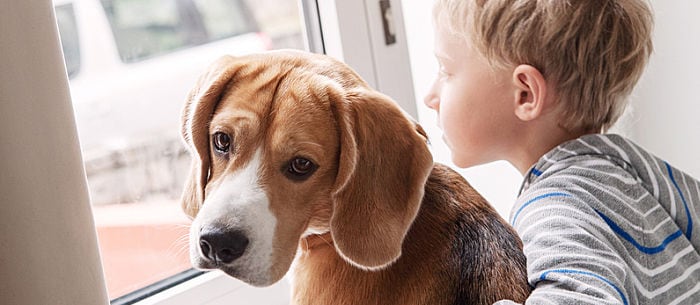Did you know that dog depression is as real as human depression? And just like human depression, understanding the causes and symptoms can help ensure a happy, healthy life for your dog. “Dogs, and many other species of social animals (probably not ants, but certainly elephants) can become depressed — but not about the state of world affairs, the economy, a disappointing sports performance or business presentation, a bad date or any of the other things that get us down,” explains Dr. Peter Borchelt, an animal behavior consultant in New York City.
Possible Causes of Dog Depression
A healthy, well-adjusted dog won’t get depressed if your dog walker gets locked out for one day and he’s left alone until you get home. But if your dog is often alone for most of the day and night, the loneliness can take its toll. A dog is more likely to develop depression as a reaction to a more permanent situation. Depression often stems from loss of a companion or prolonged absence of an owner or another pet.
A dog can get depressed when an owner or animal companion dies, when a person or animal in her life is gone, or there’s another change in the household that feels like that kind of loss. A dog suffering from depression will lose interest in many normal behaviors like play, social contact, friendly greetings, feeding and curiosity. Note that being in an environment that doesn’t provide opportunity for these can also cause depression.
Is Your Dog Depressed? Learn the Signs and Symptoms
When humans are depressed the symptoms are varied and complex but a person can vocalize their feelings. With dogs, it’s harder.
Here are some dog signs of depression:
- Extreme increase in appetite
- Extreme decrease in appetite
- Excessive sleeping during hours when she used to be playful and engaged
- Excessive restlessness and sleeplessness
- A less enthusiastic reaction to things he loves, like playtime, walks, treats and you walking through the door
- Licking or chewing paws to self-soothe
- Hiding or avoidance
These symptoms, especially when they coincide with loss or a situation change, could indicate mood-related problems that require behavioral therapy or, in some cases, medication, according to experts at the American Kennel Club. Of course, these symptoms can also mean that your dog is in pain or suffering from a physical issue like arthritis.
A dog may suffer from separation anxiety, a mild variant of depression, when you’re gone for prolonged periods, according to experts at the ASPCA. Long-term separation anxiety can actually lead to depression. You can tell your dog may be affected by your absence if she begins barking excessively, chewing furniture or door frames, or going to the bathroom in unacceptable places. A dog with separation anxiety might also demonstrate his feelings with overenthusiastic greeting, excessive social contact and manic play demands when you come home.
How to Treat Your Dog For Depression
“In some cases, animal depression/anxiety can be treated with anti-anxiety/antidepressant medications, which of course must be approved and prescribed by a veterinarian,” Dr. Borchelt explains.
If you think your dog may be at risk for depression, an ounce of prevention is worth a pound of cure. Provide your dog with novel things that stimulate all of her senses and her mind.
Here are some ideas:
- New scents and smell tracking games (find the treat!)
- Soothing music played at a low volume during the day
- The right amount of visual stimulation — a blanket over a crate if a dog is overstimulated, or a mobile or other moving object for something interesting and new to look at
- Petting, brushing, massage and other physical contact
- Occasional special food treats to stimulate his taste buds
- Games and training exercises for mental stimulation, like treat puzzles
- Physical activity like running, jogging and playing fetch
- Socialization with other dogs and human companions
The bottom line is that just as with a depressed human friend, your canine companion can benefit from having you be there for her as a reassuring, loving and present friend.
And check out these Dog Massage Techniques.
Cara Stevens is a freelance writer living in Connecticut with her husband, two children and a small, white dog named Oliver. She has authored several books for children and writes frequently about parenting, hair care, DIY crafts, food and healthy living. Follow her on Facebook and Twitter.





